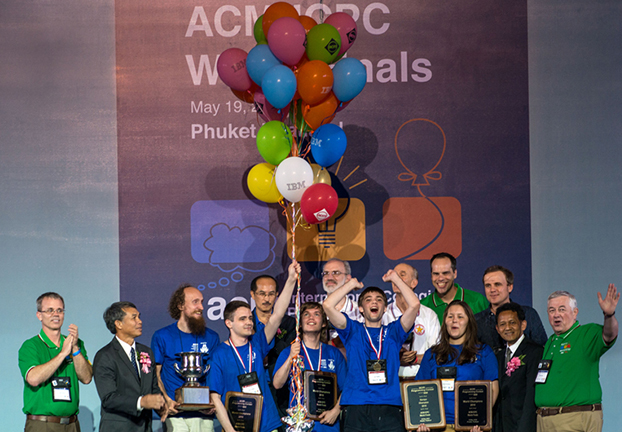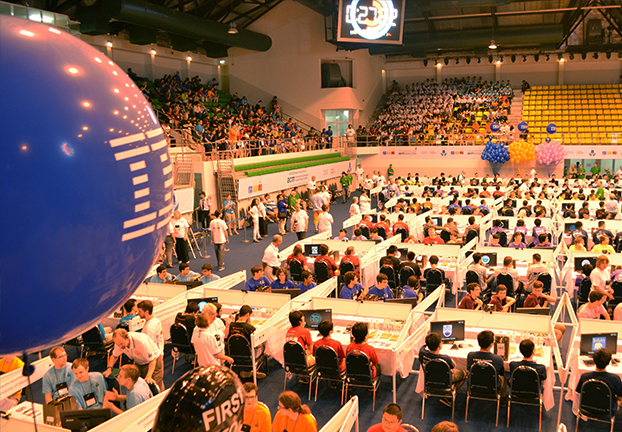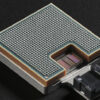PHUKET, THAILAND – Students from St. Petersburg State University topped the of the 40th ACM International Collegiate Programming Contest (ICPC) world finals. Sponsored by IBM, the contest that was this year hosted at Prince of Songkla University in Phuket, brought together over 1,400 developers from 40 countries to: 1) compete on an elite level of programming, and 2) interact and build with IBM’s developer tools and APIs on IBM Cloud.

Students from St. Petersburg State University topped the of the 40th ACM International Collegiate Programming Contest (ICPC) world finals.
Ateneo de Manila University, the sole university to represent the Philippines, placed 85th among 128 university teams, each comprised of three students, which solved a series of real-world programming problems in just five hours.
For IBM’s Andrew Hately, ICPC’s goal to solve “real-world programming problems” is beneficial to everyone. “The more problems are solved, the better it is for the industry. (Inadvertently) this is good for IBM, too,” he said.
According to Dr. Bill Poucher, ICPC executive director and Baylor University professor, the annual gathering highlights how “if you invest more in your students, then you get better students. Everyone gets better the more you invest in them – this needs to be emphasized.”
Added Gerald Lane, ACM-ICPC sponsorship executive and director, IBM Open Technologies & IP: “These students are the future leaders of our industry and we are committed to fostering their development with these critical technologies as they prepare to enter the global workforce.”
The position to “invest more to better the students” was even more stressed in this year’s gathering where only a handful of female programmers participated. According to Poucher, “opportunity for women in IT is unlimited. This is a promise land, so (they need to) get in there.” Nonetheless, the current state (where there remain less female programmers participating in gatherings like ICPC) highlight that “less investment get injected into developing them.” And so “the number one thing to do is get more women to get in more programming, more math.”

Ateneo de Manila University, the sole university to represent the Philippines, placed 85th among 128 university teams.
Shanghai Jiao Tong University, Harvard University and Moscow Institute of Physics and Technology finished the competition in second, third, and fourth places. This year’s regional champions are:
- Cairo University – Faculty of Computers and Information (Africa and the Middle East)
- Shanghai Jiao Tong University (Asia)
- St. Petersburg State University (Europe)
- Universidad Nacional de Rosario (Latin America)
- Harvard University (North America)
- University of New South Wales (South Pacific)
The top 12 teams are:
- St. Petersburg State University (GOLD, 2016 WORLD CHAMPION)
- Shanghai Jiao Tong University (GOLD, 2nd Place)
- Harvard University (GOLD, 3rd Place)
- Moscow Institute of Physics and Technology (GOLD, 4th Place)
- University of Warsaw (SILVER, 5th Place)
- Massachusetts Institute of Technology (SILVER, 6th Place)
- St. Petersburg ITMO University (SILVER, 7th Place)
- Ural Federal University (SILVER, 8th Place)
- University of Wroclaw (BRONZE, 9th Place)
- Nizhny Novgorod State University (BRONZE, 10th Place)
- Lviv National University (BRONZE, 11th Place)
- Fudan University (BRONZE, 12th Place)
The 128 world finalists emerged from local and regional ICPC competitions this past fall. Initially, selection took place from a field of more than 300,000 students in computing disciplines worldwide. At least 40,266 contestants from 2,736 universities in 102 countries on six continents competed at more than 480 sites.
By sponsoring the ACM ICPC world finals, IBM enables contestants to learn about the available advanced cloud toolbox. IBM has been expanding breakthrough technologies accessed by developers through its cloud, including quantum computing, blockchain and cognitive. This foundation of tools equips programmers, designers and coders with the potential to build apps across industries.



















































































































